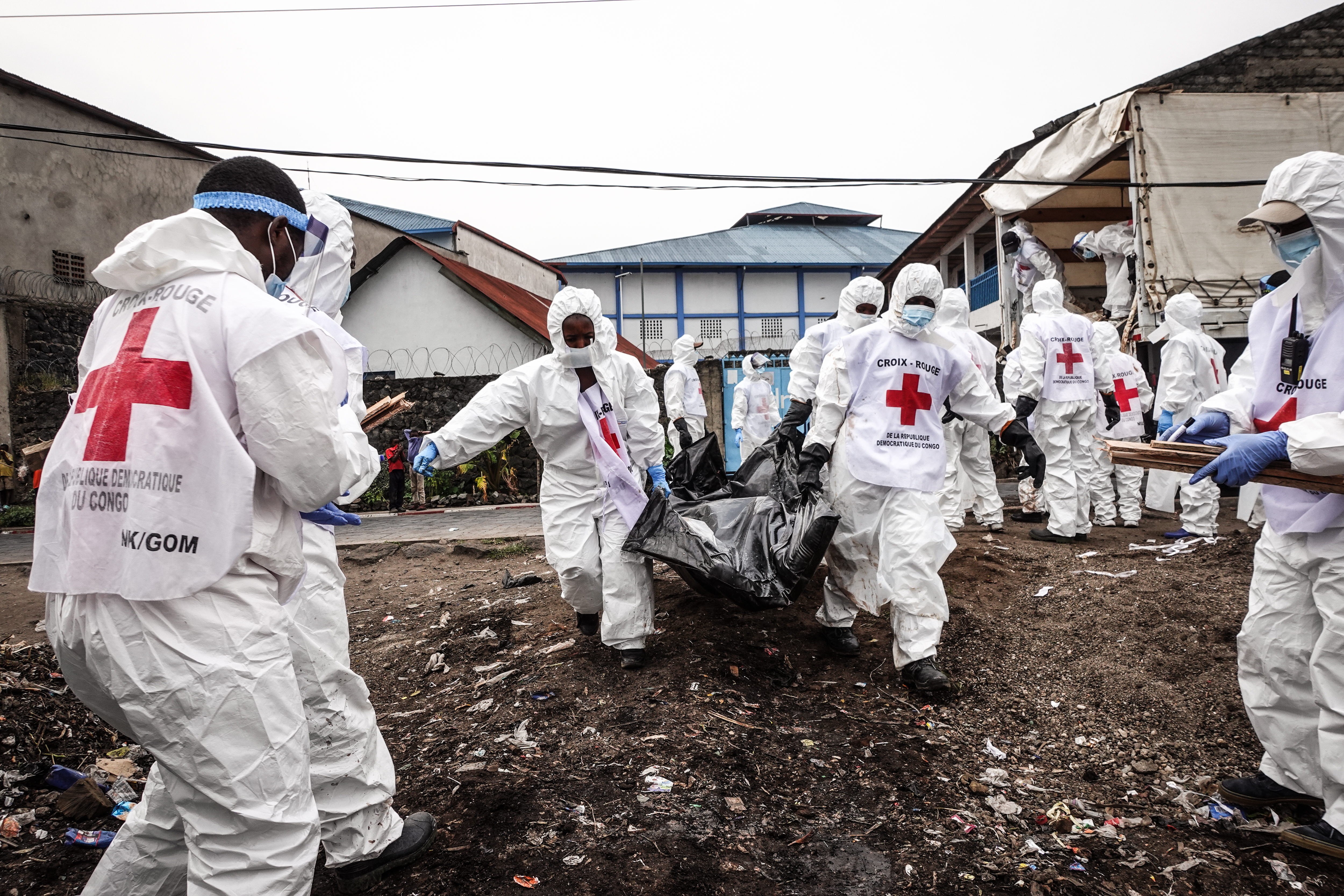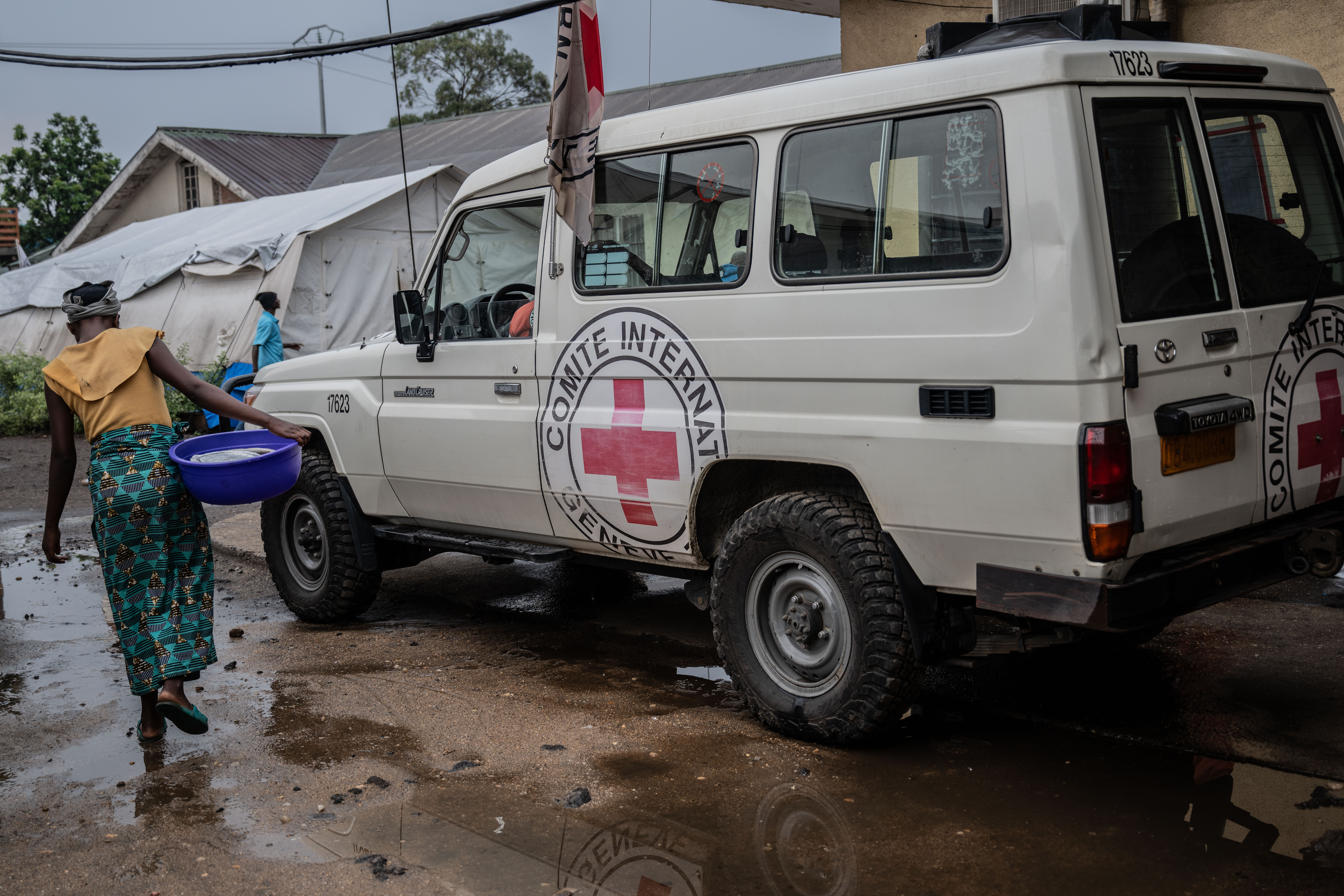
Red Cross warns of forgotten humanitarian crisis in DRC

In the Democratic Republic of Congo (DRC), a rebel offensive has plunged hundreds of thousands of civilians into an acute humanitarian crisis, with mass displacements, overstretched hospitals and widespread violence. On the ground, the International Committee of the Red Cross (ICRC) is trying to address the emergency.
“The humanitarian situation is catastrophic. We’ve seen a level of intensity in the conflict that we have never seen before, including the use of heavy artillery in urban areas,” says Myriam Favier, head of the ICRC sub-delegation in Goma, eastern DRC. The town fell to rebels of the March 23 Movement (M23) at the end of January in an attack that left at least 3,000 people dead.
“There were bodies in the town and a huge number of wounded, which meant that the hospitals were overloaded, including those supported by the ICRC,” Favier says.
In the Kivu provinces of eastern DRC, clashes between the Congolese army and the Rwandan-backed M23 rebel group are plunging civilians into terror. Some 7 million people are now displaced within the country, including nearly 500,000 since the beginning of January alone, according to the United Nations.
For 30 years, the DRC has been ravaged by a series of conflicts involving various armed groups. Fighting has resulted in the deaths of more than 6 million people and in a persistent humanitarian crisis.
>>Watch how ICRC is handling the situation on the ground (in French)
“The Congo is a huge country, potentially extremely rich, but the population is very poor and is paying a high price for this fighting,” Benoît Feyt, a journalist with Belgian public service broadcaster RTBF, told Swiss public television RTS.
This forgotten crisis has seen renewed violence for several months, as the M23 made advances. The DRC accuses Rwanda of supporting the M23 rebels to plunder Congolese natural resources like coltan. Rwanda denies this and calls for the neutralisation of another armed group in the DRC that it considers a threat: the Forces Démocratiques de Libération du Rwanda (FDLR), founded by Rwandan Hutus, including some who were involved in the 1994 genocide in Rwanda.
Risk of epidemics
In Goma, the ICRC is continuing its activities despite the insecurity, treating the wounded, burying bodies and restoring access to drinking water. “We’re also concentrated on repairing power lines and pumping stations, as there was no electricity or water in the town of Goma for several days, which is essential for the civilian population,” explains Favier.
Some residents had no choice but to draw their water from Lake Kivu, from which bodies were pulled after the fighting in Goma city.
“We were in a race against time to collect the remains, because there is a real health risk, particularly from cholera, which can spread when bodies are not collected,” says Favier. The World Health Organization (WHO) also warns that Mpox (monkey pox), which has increased since the M23 offensive, could spread.
Humanitarian access hampered
Humanitarian access remains a daily challenge in the east of the country. Airports are closed, UN convoys have been attacked by M23 rebels, and warehouses looted. Three aid workers from the NGO Entraide Protestante Suisse (EPER) were killedExternal link in early February in North Kivu.
“Working conditions have been extremely complicated,” says Favier. “The ICRC medical warehouse and other warehouses were looted. But there was a great deal of solidarity on the part of the humanitarian actors in Goma, which enabled us to continue providing care until other solutions could be found.”
Operations have been made even more difficult by the temporary freeze on American foreign aid, on which the DRC is 70% dependent. In 2024, the country was one of the world’s largest recipients of aid from Washington ($910 million or CHF820 million).
Surge in sexual violence
The M23 has been gaining ground, especially since it captured the South Kivu capital Bukavu in mid-February. The ICRC now fears that the crisis could spread even further. The UN warns there could be a surge in sexual violence and the recruitment of children by armed groups. During an escape from Muzenze prison during the capture of Goma, 165 female prisoners were raped by male prisoners before being killed in a fire, reports the UN.
“Rape has been a weapon of war in the Congo for decades, but this has not really compelled the international community to do anything about it,” Feyt told RTS.
International condemnation
Feyt, who has just returned from the DRC, thinks it is up to international actors to act to end the conflict. “The Congolese people are waiting for the international community to put pressure and apply sanctions on Rwanda so that it withdraws and stops supporting the M23,” he says. “But for the moment, apart from weak declarations calling for a ceasefire, nothing is happening on the ground.”
He recalls that in 2012, the M23 – already supported by Rwanda at the time – took Goma for the first time, before retreating under international pressure, particularly from then-US President Barack Obama.

Last month, the UN Security Council for the first time directly condemned Rwanda for supporting the M23. Adopted unanimously, the resolution demanded that the rebel group withdraw from the conquered territories, in particular Goma and Bukavu, and called on the Rwandan armed forces to “cease their support for the M23 and withdraw immediately from the territory of the DRC, without pre-conditions”. In Geneva, the UN Human Rights Council approved a fact-finding mission to investigate violations committed in the east of the country. Its first report is expected in September 2025.
Edited by Virginie Mangin. Adapted from French by Julia Crawford/gw

In compliance with the JTI standards
More: SWI swissinfo.ch certified by the Journalism Trust Initiative
































You can find an overview of ongoing debates with our journalists here . Please join us!
If you want to start a conversation about a topic raised in this article or want to report factual errors, email us at english@swissinfo.ch.